The wine scene also has its prejudices and clichés. For example, all Bordeaux are sinfully expensive, all Californians taste the same, Austria only produces "Grüner Veltliner", in Germany the wines are always sweet.... All this is certainly false, although there is always a kernel of truth hidden in it
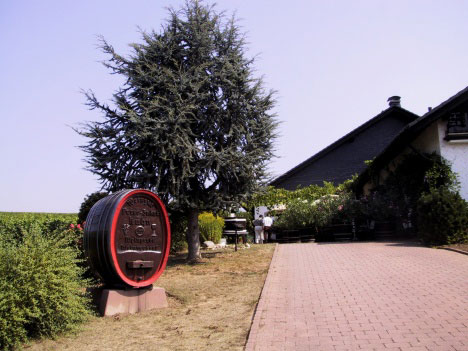 |
| Visit to Peter Jakob Kühn% Rheingau |
Many prestigious Bordeaux are in fact far too expensive, but there is also the good simple affordable Bordeaux; many Californian wines are mass-produced wines that in fact hardly differ from each other; in many village taverns in eastern Switzerland nothing but "grüner Veltliner" is offered; German wines are - compared to Swiss wines - anything but really dry
All these examples come from everyday life, are nourished by experience, especially when consumed in restaurants. It was not so long ago that I always ordered "the driest open red" in German inns and always received a wine that was - for my palate - far too sweet
The wine connoisseur knows, of course, that reality is different, that there are many wines in Germany that are dry, even "world class" in their way, above all the Riesling
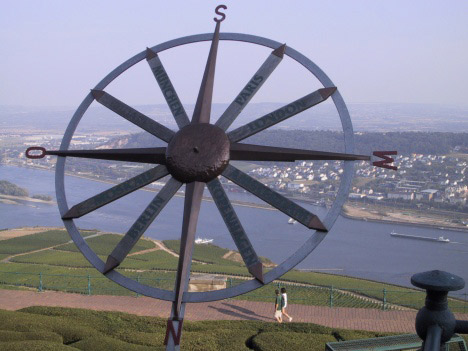 |
| Famous German vineyards high above the Rhine |
However, this knowledge is still far from reaching the "everyday wine drinker". Little Switzerland (population just under 7.5 million) is surrounded by four large nations, two of which have much to offer in terms of wine worldwide: France and Italy. That is where the wine-drinking Swiss turns first, certainly not to the north (Germany) or east (Austria)
Switzerland's comprehensive wine-buying guide, "vinfox", lists 350 leading wine merchants in Switzerland, offering 132,400 wines from 8,200 producers, on 540 pages. German wines take up just 6 pages of that (for comparison: France 223, Italy 126, Spain 28 pages)
It is true that around 50 merchants also offer German wines, but mostly only a few, from one or two wineries. It is mainly "sweet" wines, apart from Riesling, Beeren- and Trockenbeerenauslese and Eiswein take centre stage. These are specialities that have long been recognised in Switzerland
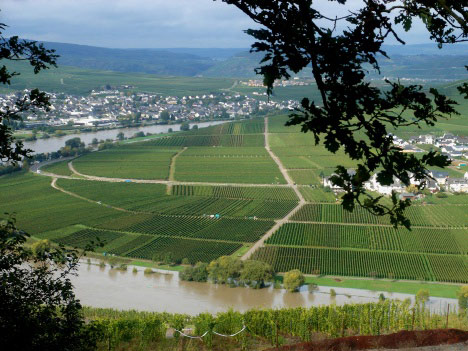 |
| In Switzerland, it is mainly wines from the Mosel that are known |
For some years now, however, there have been a few larger wine distributors who systematically focus on German wines. For example, "Boucherville" in Zurich, "Riesling" in Bern, and above all "Gerstl" in eastern Switzerland (Bad Ragaz - today's company headquarters in Zurich). The three wine shops have an impressive selection of German wines, not only wines with a lot of residual sweetness, but also dry Rieslings. I quote Max Gerstl, the co-founder of the wine festival in Bad Ragaz (every two years), as a representative. A few years ago, he renamed his "Cave Bordelais" "Weinselektionen Gerstl" and thus documented to the outside world that he no longer has "only" Bordeaux to offer: "Up to now, I concentrated mainly on residually sweet wines (from Germany). In the meantime - and I'm happy to admit it - after initial scepticism, I have entered a new dimension with the so-called Grosse Gewächsen...." So it is of course particularly interesting to see which wines the "German pioneer" among Swiss wine merchants has included in his programme. First of all, 8 names: Robert Weil; Rheingau, Jakob Jung, Rheingau; Peter Jakob Kühn, Rheingau; Klaus Peter Keller, Rheinhessen; Wittmann, Reinhessen; Steffen Christmann, Pfalz; Michael Fröhlich, Franconia; J. J. Prüm, Mosel
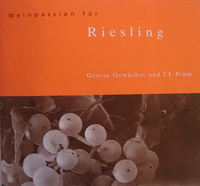 |
| Probably the only retailer catalogue in Switzerland% that lists only dry German Rieslings |
I can already see readers wrinkling their noses: all of them are so-called "Grosse Gewächse" from thoroughly reputable winegrowers. But where are the others? The Palatinate, the Saarland, Baden, the Aar..... The wine merchant, who has to sell the wines in Switzerland, explains his reticence as follows: "The demand for these wines is still rather modest in Switzerland, so we are satisfied with an offer of 10 wines. So I had the wonderful task of picking out the 10 best from 150 wines...." Are these really the 10 best dry Rieslings? I won't allow myself to judge. For the past four years, I have spent a few days in autumn with my German wine friends touring the best Riesling regions: Rheingau, Franconia, Palatinate, Mosel-Saar-Ruwer... And everywhere - guided by my dear German friends - I discovered quite a few good, even excellent, unique wines. Not only among the famous names and the "Great Growths"
This example shows how quickly and thoroughly clichés and prejudices dominate the wine scene, how quickly and thoroughly everything is thrown into one big pot (wine vat, I guess), and yet how differentiated the worldwide wine scene really is
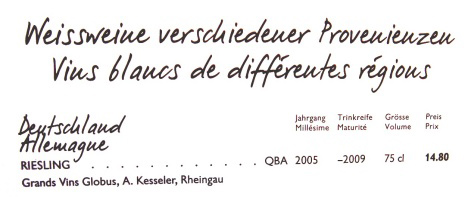 |
| Offer of the renowned wine shop "Globus". A single German Riesling in the catalogue |
Ultimately, it is the market and not the quality that determines what is offered from the various wine regions of the world. The market, however, is aimed at the so-called "mass taste", which can only be influenced with a lot of effort and very slowly. German wines are simply not "in" in Switzerland - and even the best Riesling has a hard time there
I don't even want to talk about German red wines: they make up only about one per cent of the already sparse German offerings and are almost exclusively limited to Pinot Noir. Lemberger, Dornfelder, Zweigelt, Merlot, Sankt-Laurent... there are hardly any from Germany. They are all virtually unknown in Switzerland. And what you don't know has no market
See above, at the beginning of the column
Sincerely
Yours sincerely
Peter (Züllig)